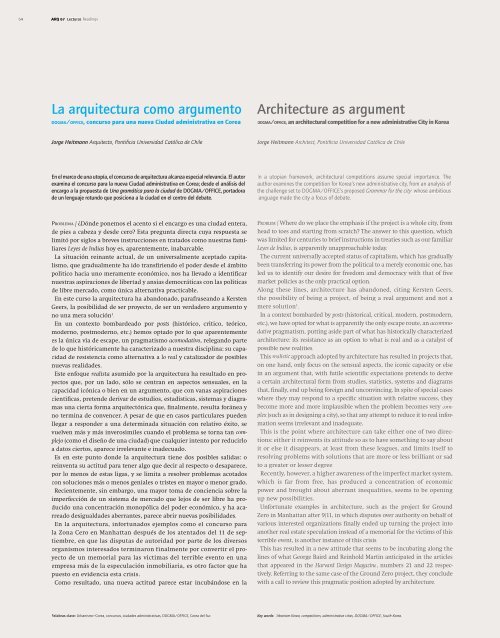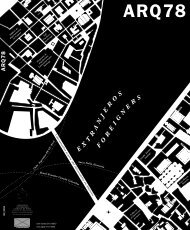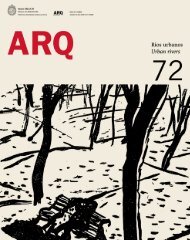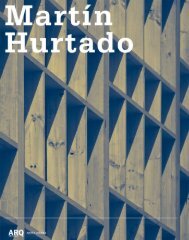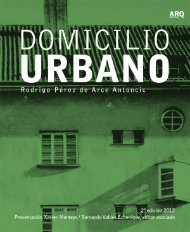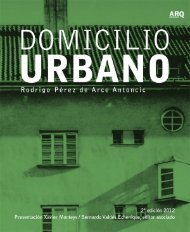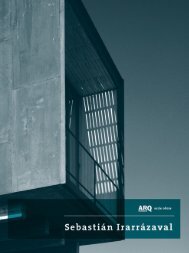Descargar PDF - Ediciones ARQ
Descargar PDF - Ediciones ARQ
Descargar PDF - Ediciones ARQ
- No tags were found...
Create successful ePaper yourself
Turn your PDF publications into a flip-book with our unique Google optimized e-Paper software.
64 67Lecturas ReadingsLa arquitectura como argumentoD O G M A/OFFICE, concurso para una nueva Ciudad administrativa en CoreaArchitecture as argumentD O G M A/OFFICE, an architectural competition for a new administrative City in KoreaJorge Heitmann Arquitecto, Pontifi cia Universidad Católica de ChileJorge Heitmann Architect, Pontifi cia Universidad Católica de ChileEn el marco de una utopía, el concurso de arquitectura alcanza especial relevancia. El autorexamina el concurso para la nueva Ciudad administrativa en Corea; desde el análisis delencargo a la propuesta de Una gramática para la ciudadde DOGMA/OFFICE, portadorade un lenguaje rotundo que posiciona a la ciudad en el centro del debate.In a utopian framework, architectural competitions assume special importance. Theauthor examines the competition for Korea’s new administrative city, from an analysis ofthe challenge set to DOGMA/OFFICE’s proposed Grammar for the city, whose ambitiouslanguage made the city a focus of debate.PR O B L E M A/ ¿Dónde ponemos el acento si el encargo es una ciudad entera,de pies a cabeza y desde cero? Esta pregunta directa cuya respuesta selimitó por siglos a breves instrucciones en tratados como nuestras familiaresLeyes de Indias hoy es, aparentemente, inabarcable.La situación reinante actual, de un universalmente aceptado capitalismo,que gradualmente ha ido transfiriendo el poder desde el ámbitopolítico hacia uno meramente económico, nos ha llevado a identificarnuestras aspiraciones de libertad y ansias democráticas con las políticasde libre mercado, como única alternativa practicable.En este curso la arquitectura ha abandonado, parafraseando a KerstenGeers, la posibilidad de ser proyecto, de ser un verdadero argumento yno una mera solución 1 .En un contexto bombardeado por posts (histórico, crítico, teórico,moderno, postmoderno, etc.) hemos optado por lo que aparentementees la única vía de escape, un pragmatismo acomodativo, relegando partede lo que históricamente ha caracterizado a nuestra disciplina: su capacidadde resistencia como alternativa a lo real y catalizador de posiblesnuevas realidades.Este enfoque realista asumido por la arquitectura ha resultado en proyectosque, por un lado, sólo se centran en aspectos sensuales, en lacapacidad icónica o bien en un argumento, que con vanas aspiracionescientíficas, pretende derivar de estudios, estadísticas, sistemas y diagramasuna cierta forma arquitectónica que, finalmente, resulta foránea yno termina de convencer. A pesar de que en casos particulares puedenllegar a responder a una determinada situación con relativo éxito, sevuelven más y más inverosímiles cuando el problema se torna tan complejo(como el diseño de una ciudad) que cualquier intento por reducirloa datos ciertos, aparece irrelevante e inadecuado.Es en este punto donde la arquitectura tiene dos posibles salidas: oreinventa su actitud para tener algo que decir al respecto o desaparece,por lo menos de estas ligas, y se limita a resolver problemas acotadoscon soluciones más o menos geniales o tristes en mayor o menor grado.Recientemente, sin embargo, una mayor toma de conciencia sobre laimperfección de un sistema de mercado que lejos de ser libre ha producidouna concentración monopólica del poder económico, y ha acarreadodesigualdades aberrantes, parece abrir nuevas posibilidades.En la arquitectura, infortunados ejemplos como el concurso parala Zona Cero en Manhattan después de los atentados del 11 de septiembre,en que las disputas de autoridad por parte de los diversosorganismos interesados terminaron finalmente por convertir el proyectode un memorial para las víctimas del terrible evento en unaempresa más de la especulación inmobiliaria, es otro factor que hapuesto en evidencia esta crisis.Como resultado, una nueva actitud parece estar incubándose en laPRO B L E M/ Where do we place the emphasis if the project is a whole city, fromhead to toes and starting from scratch? The answer to this question, whichwas limited for centuries to brief instructions in treaties such as our familiarLeyes de Indias, is apparently unapproachable today.The current universally accepted status of capitalism, which has graduallybeen transferring its power from the political to a merely economic one, hasled us to identify our desire for freedom and democracy with that of freemarket policies as the only practical option.Along these lines, architecture has abandoned, citing Kersten Geers,the possibility of being a project, of being a real argument and not amere solution 1 .In a context bombarded by posts(historical, critical, modern, postmodern,etc.), we have opted for what is apparently the only escape route, an accommo-dativepragmatism, putting aside part of what has historically characterizedarchitecture: its resistance as an option to what is real and as a catalyst ofpossible new realities.This realisticapproach adopted by architecture has resulted in projects that,on one hand, only focus on the sensual aspects, the iconic capacity or elsein an argument that, with futile scientific expectations pretends to derivea certain architectural form from studies, statistics, systems and diagramsthat, finally, end up being foreign and unconvincing. In spite of special caseswhere they may respond to a specific situation with relative success, theybecome more and more implausible when the problem becomes very complex(such as in designing a city), so that any attempt to reduce it to real informationseems irrelevant and inadequate.This is the point where architecture can take either one of two directions:either it reinvents its attitude so as to have something to say aboutit or else it disappears, at least from these leagues, and limits itself toresolving problems with solutions that are more or less brilliant or sadto a greater or lesser degree.Recently, however, a higher awareness of the imperfect market system,which is far from free, has produced a concentration of economicpower and brought about aberrant inequalities, seems to be openingup new possibilities.Unfortunate examples in architecture, such as the project for GroundZero in Manhattan after 9/11, in which disputes over authority on behalf ofvarious interested organizations finally ended up turning the project intoanother real estate speculation instead of a memorial for the victims of thisterrible event, is another instance of this crisis.This has resulted in a new attitude that seems to be incubating along thelines of what George Baird and Reinhold Martin anticipated in the articlesthat appeared in the Harvard Design Magazine, numbers 21 and 22 respectively.Referring to the same case of the Ground Zero project, they concludewith a call to review this pragmatic position adopted by architecture.Palabras clave: Urbanismo–Corea, concursos, ciudades administrativas, DOGMA/OFFICE, Corea del Sur.Key words: Urbanism-Korea, competitions, administrative cities, DOGMA/OFFICE, South Korea.


